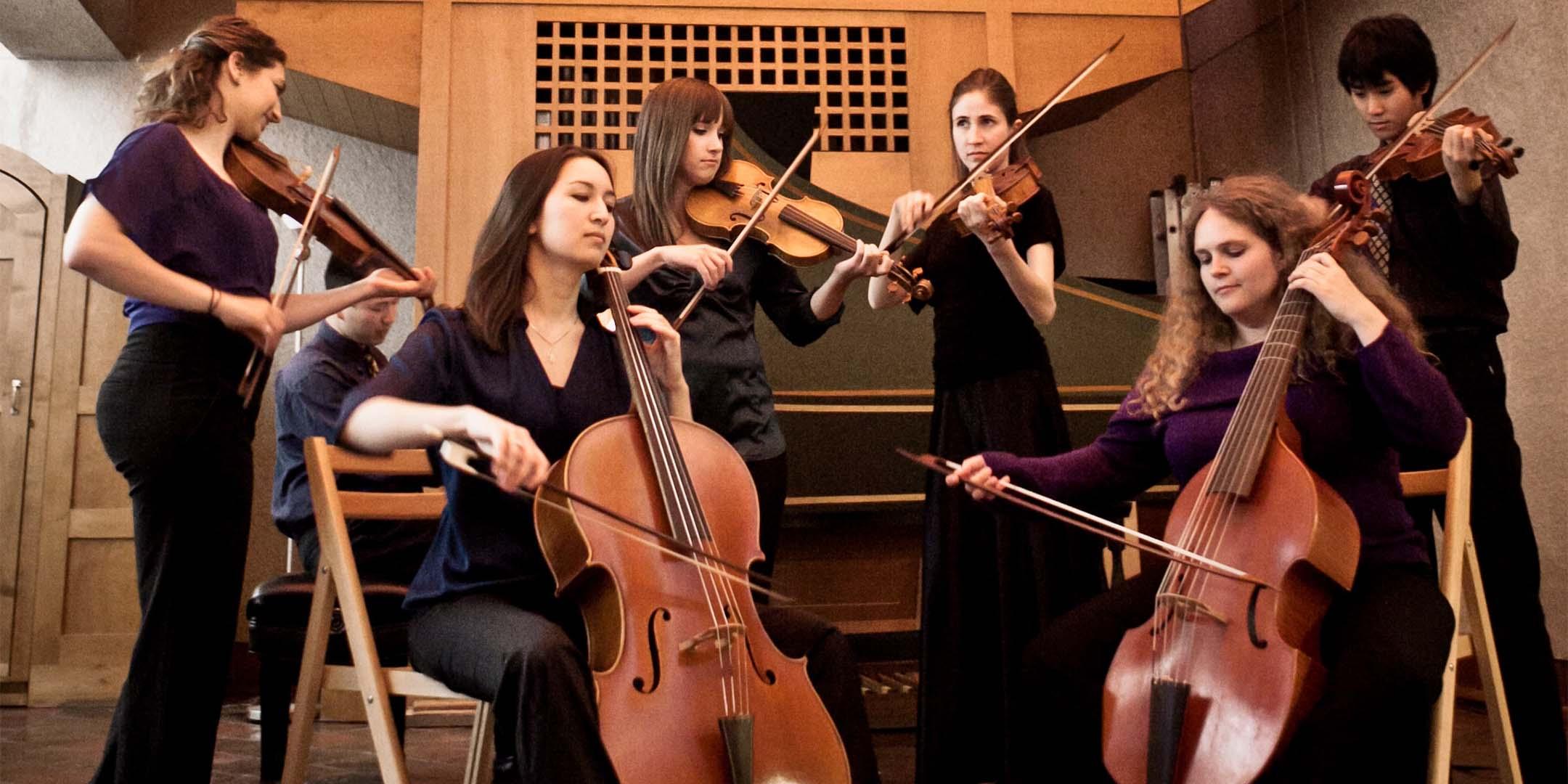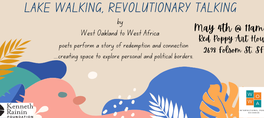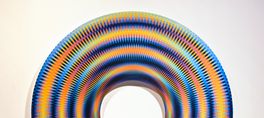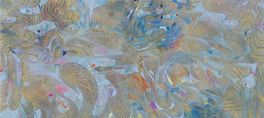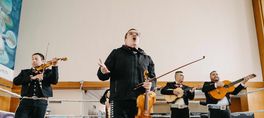PRESIDIO LIVE – Thursday Evenings at 7 pm
In Presidio Live, experience live music, theatre, dance, film, and dialogues that offer a contemporary take on the history and nature of the Presidio and the culture of our diverse Bay Area community.
MUSA is a chamber ensemble dedicated to historically informed performances of Baroque and Classical repertoire, as well as to supporting and encouraging composers to write new works for period instruments. From trio sonatas to orchestral works, MUSA has presented programs on numerous concert series across the Bay Area. For this performance they will present "Chinese Baroque," a program of Western music written in and for the Chinese courts, as well as Chinese music transcribed by European visitors of the 17th and 18th centuries.
Offered in partnership with InterMusic SF.
MUSA aims to present quality, historically informed performances, showcasing the talents of younger professionals based in the Bay Area and beyond. The ensemble believes firmly in the continued relevance of live performance, and works actively to reach new audiences.
PerformersRita Lilly, soprano Mindy Ella Chu, mezzo-soprano Addi Liu, violin — Joannes Georgius Hellmer, 1770 Gretchen Claassen, 'cello — Anonymous French mid-19th c. Derek Tam, harpsichord —Willard Martin, 1985, single manual French instrument after Blanchet, 1720 David Wong, guqin — "Great Ocean Dragon Calls", by Ni Shuyin, made from a piece of Ming Dynasty wood
Program Details
Two Chinese folk song "transcriptions" — Moo-lee-chwa & Higho highauKarl Kambra (pub. 1796, London) The Macartney Mission of 1793 inspired a fresh wave of interest in Chinese culture. This English publication includes two renderings of the Chinese folk song "Moo-Lee-Chwa, or Jasmine Flower,” one in its (supposed) original form, the other rendered "more agreeable to the English ear," harmonized and supplied with English lyrics.
Selections from Op. 3 — 12 sonatas for violin and basso continuo Teodorico Pedrini (1671-1746) Teodorico Pedrini's twelve sonatas were the only Western-style Baroque work known to have been written in China. For 36 years, Pedrini served as a Vincentian missionary to the imperial Chinese court, and was the music tutor for three sons of the Kangxi Emperor. He was also the co-author of the first Chinese treatise of Western music theory. While Pedrini’s sonatas are modeled after those of his compatriot Arcangelo Corelli, they are distinctive pieces in their own right.
Selected guqin solos from the 17th and 18th centuries
"Divertissements" from "Memoire sur la musique des Chinois" (pub. Paris, 1776-1791) by Jean-Joseph Marie Amiot A French Jesuit missionary to the Chinese court, Amiot's writings form the most complete written record by a Western of late 18th-century China.
"Les Sauvages" by Jean-Philipp Rameau Amiot tried (and failed) to impress the court mandarins with this harpsichord solo by Rameau. Says Amiot: "They replied as politely as they possibly could that our songs are not made for their ears, nor their ears for our songs, it was not surprising that they did not sense the beauties of them, as they sensed them in their own."
Selections of historical guqin tunes set to Chinese poetry by Matteo Ricci (1552-1610)One of the leading founders of the Jesuit China missions, Ricci's missionary endeavors took him from Macau to Beijing, paving the way for two centuries of fruitful dialogue between Western missionaries and the Chinese court.
"Messe des Jésuites à Pékin" by Charles d'Ambleville (d. 1637) Written by the French composer Charles d'Ambleville for use by the Jesuits in the Chinese court, this mass hearkens back to an archaic style that was old-fashioned even in its day.
'A Chinese Air', as published in the Gentleman's Magazine (1657) Transcribed "note for note" and harmonized from a extemporaneous performance by Loum Kiqua, a Chinese merchant then in London, this air has very features that we associate with Chinese music. It demonstrates the wide divide separating Western and Chinese culture.
Photo Credit: Matthew Washburn
Read more about our event registration policy >>
show less
In Presidio Live, experience live music, theatre, dance, film, and dialogues that offer a contemporary take on the history and nature of the Presidio and the culture of our diverse Bay Area community.
MUSA is a chamber ensemble dedicated to historically informed performances of Baroque and Classical repertoire, as well as to supporting and encouraging composers to write new works for period instruments. From trio sonatas to orchestral works, MUSA has presented programs on numerous concert series across the Bay Area. For this performance they will present "Chinese Baroque," a program of Western music written in and for the Chinese courts, as well as Chinese music transcribed by European visitors of the 17th and 18th centuries.
Offered in partnership with InterMusic SF.
MUSA aims to present quality, historically informed performances, showcasing the talents of younger professionals based in the Bay Area and beyond. The ensemble believes firmly in the continued relevance of live performance, and works actively to reach new audiences.
PerformersRita Lilly, soprano Mindy Ella Chu, mezzo-soprano Addi Liu, violin — Joannes Georgius Hellmer, 1770 Gretchen Claassen, 'cello — Anonymous French mid-19th c. Derek Tam, harpsichord —Willard Martin, 1985, single manual French instrument after Blanchet, 1720 David Wong, guqin — "Great Ocean Dragon Calls", by Ni Shuyin, made from a piece of Ming Dynasty wood
Program Details
Two Chinese folk song "transcriptions" — Moo-lee-chwa & Higho highauKarl Kambra (pub. 1796, London) The Macartney Mission of 1793 inspired a fresh wave of interest in Chinese culture. This English publication includes two renderings of the Chinese folk song "Moo-Lee-Chwa, or Jasmine Flower,” one in its (supposed) original form, the other rendered "more agreeable to the English ear," harmonized and supplied with English lyrics.
Selections from Op. 3 — 12 sonatas for violin and basso continuo Teodorico Pedrini (1671-1746) Teodorico Pedrini's twelve sonatas were the only Western-style Baroque work known to have been written in China. For 36 years, Pedrini served as a Vincentian missionary to the imperial Chinese court, and was the music tutor for three sons of the Kangxi Emperor. He was also the co-author of the first Chinese treatise of Western music theory. While Pedrini’s sonatas are modeled after those of his compatriot Arcangelo Corelli, they are distinctive pieces in their own right.
Selected guqin solos from the 17th and 18th centuries
"Divertissements" from "Memoire sur la musique des Chinois" (pub. Paris, 1776-1791) by Jean-Joseph Marie Amiot A French Jesuit missionary to the Chinese court, Amiot's writings form the most complete written record by a Western of late 18th-century China.
"Les Sauvages" by Jean-Philipp Rameau Amiot tried (and failed) to impress the court mandarins with this harpsichord solo by Rameau. Says Amiot: "They replied as politely as they possibly could that our songs are not made for their ears, nor their ears for our songs, it was not surprising that they did not sense the beauties of them, as they sensed them in their own."
Selections of historical guqin tunes set to Chinese poetry by Matteo Ricci (1552-1610)One of the leading founders of the Jesuit China missions, Ricci's missionary endeavors took him from Macau to Beijing, paving the way for two centuries of fruitful dialogue between Western missionaries and the Chinese court.
"Messe des Jésuites à Pékin" by Charles d'Ambleville (d. 1637) Written by the French composer Charles d'Ambleville for use by the Jesuits in the Chinese court, this mass hearkens back to an archaic style that was old-fashioned even in its day.
'A Chinese Air', as published in the Gentleman's Magazine (1657) Transcribed "note for note" and harmonized from a extemporaneous performance by Loum Kiqua, a Chinese merchant then in London, this air has very features that we associate with Chinese music. It demonstrates the wide divide separating Western and Chinese culture.
Photo Credit: Matthew Washburn
Read more about our event registration policy >>
PRESIDIO LIVE – Thursday Evenings at 7 pm
In Presidio Live, experience live music, theatre, dance, film, and dialogues that offer a contemporary take on the history and nature of the Presidio and the culture of our diverse Bay Area community.
MUSA is a chamber ensemble dedicated to historically informed performances of Baroque and Classical repertoire, as well as to supporting and encouraging composers to write new works for period instruments. From trio sonatas to orchestral works, MUSA has presented programs on numerous concert series across the Bay Area. For this performance they will present "Chinese Baroque," a program of Western music written in and for the Chinese courts, as well as Chinese music transcribed by European visitors of the 17th and 18th centuries.
Offered in partnership with InterMusic SF.
MUSA aims to present quality, historically informed performances, showcasing the talents of younger professionals based in the Bay Area and beyond. The ensemble believes firmly in the continued relevance of live performance, and works actively to reach new audiences.
PerformersRita Lilly, soprano Mindy Ella Chu, mezzo-soprano Addi Liu, violin — Joannes Georgius Hellmer, 1770 Gretchen Claassen, 'cello — Anonymous French mid-19th c. Derek Tam, harpsichord —Willard Martin, 1985, single manual French instrument after Blanchet, 1720 David Wong, guqin — "Great Ocean Dragon Calls", by Ni Shuyin, made from a piece of Ming Dynasty wood
Program Details
Two Chinese folk song "transcriptions" — Moo-lee-chwa & Higho highauKarl Kambra (pub. 1796, London) The Macartney Mission of 1793 inspired a fresh wave of interest in Chinese culture. This English publication includes two renderings of the Chinese folk song "Moo-Lee-Chwa, or Jasmine Flower,” one in its (supposed) original form, the other rendered "more agreeable to the English ear," harmonized and supplied with English lyrics.
Selections from Op. 3 — 12 sonatas for violin and basso continuo Teodorico Pedrini (1671-1746) Teodorico Pedrini's twelve sonatas were the only Western-style Baroque work known to have been written in China. For 36 years, Pedrini served as a Vincentian missionary to the imperial Chinese court, and was the music tutor for three sons of the Kangxi Emperor. He was also the co-author of the first Chinese treatise of Western music theory. While Pedrini’s sonatas are modeled after those of his compatriot Arcangelo Corelli, they are distinctive pieces in their own right.
Selected guqin solos from the 17th and 18th centuries
"Divertissements" from "Memoire sur la musique des Chinois" (pub. Paris, 1776-1791) by Jean-Joseph Marie Amiot A French Jesuit missionary to the Chinese court, Amiot's writings form the most complete written record by a Western of late 18th-century China.
"Les Sauvages" by Jean-Philipp Rameau Amiot tried (and failed) to impress the court mandarins with this harpsichord solo by Rameau. Says Amiot: "They replied as politely as they possibly could that our songs are not made for their ears, nor their ears for our songs, it was not surprising that they did not sense the beauties of them, as they sensed them in their own."
Selections of historical guqin tunes set to Chinese poetry by Matteo Ricci (1552-1610)One of the leading founders of the Jesuit China missions, Ricci's missionary endeavors took him from Macau to Beijing, paving the way for two centuries of fruitful dialogue between Western missionaries and the Chinese court.
"Messe des Jésuites à Pékin" by Charles d'Ambleville (d. 1637) Written by the French composer Charles d'Ambleville for use by the Jesuits in the Chinese court, this mass hearkens back to an archaic style that was old-fashioned even in its day.
'A Chinese Air', as published in the Gentleman's Magazine (1657) Transcribed "note for note" and harmonized from a extemporaneous performance by Loum Kiqua, a Chinese merchant then in London, this air has very features that we associate with Chinese music. It demonstrates the wide divide separating Western and Chinese culture.
Photo Credit: Matthew Washburn
Read more about our event registration policy >>
read more
In Presidio Live, experience live music, theatre, dance, film, and dialogues that offer a contemporary take on the history and nature of the Presidio and the culture of our diverse Bay Area community.
MUSA is a chamber ensemble dedicated to historically informed performances of Baroque and Classical repertoire, as well as to supporting and encouraging composers to write new works for period instruments. From trio sonatas to orchestral works, MUSA has presented programs on numerous concert series across the Bay Area. For this performance they will present "Chinese Baroque," a program of Western music written in and for the Chinese courts, as well as Chinese music transcribed by European visitors of the 17th and 18th centuries.
Offered in partnership with InterMusic SF.
MUSA aims to present quality, historically informed performances, showcasing the talents of younger professionals based in the Bay Area and beyond. The ensemble believes firmly in the continued relevance of live performance, and works actively to reach new audiences.
PerformersRita Lilly, soprano Mindy Ella Chu, mezzo-soprano Addi Liu, violin — Joannes Georgius Hellmer, 1770 Gretchen Claassen, 'cello — Anonymous French mid-19th c. Derek Tam, harpsichord —Willard Martin, 1985, single manual French instrument after Blanchet, 1720 David Wong, guqin — "Great Ocean Dragon Calls", by Ni Shuyin, made from a piece of Ming Dynasty wood
Program Details
Two Chinese folk song "transcriptions" — Moo-lee-chwa & Higho highauKarl Kambra (pub. 1796, London) The Macartney Mission of 1793 inspired a fresh wave of interest in Chinese culture. This English publication includes two renderings of the Chinese folk song "Moo-Lee-Chwa, or Jasmine Flower,” one in its (supposed) original form, the other rendered "more agreeable to the English ear," harmonized and supplied with English lyrics.
Selections from Op. 3 — 12 sonatas for violin and basso continuo Teodorico Pedrini (1671-1746) Teodorico Pedrini's twelve sonatas were the only Western-style Baroque work known to have been written in China. For 36 years, Pedrini served as a Vincentian missionary to the imperial Chinese court, and was the music tutor for three sons of the Kangxi Emperor. He was also the co-author of the first Chinese treatise of Western music theory. While Pedrini’s sonatas are modeled after those of his compatriot Arcangelo Corelli, they are distinctive pieces in their own right.
Selected guqin solos from the 17th and 18th centuries
"Divertissements" from "Memoire sur la musique des Chinois" (pub. Paris, 1776-1791) by Jean-Joseph Marie Amiot A French Jesuit missionary to the Chinese court, Amiot's writings form the most complete written record by a Western of late 18th-century China.
"Les Sauvages" by Jean-Philipp Rameau Amiot tried (and failed) to impress the court mandarins with this harpsichord solo by Rameau. Says Amiot: "They replied as politely as they possibly could that our songs are not made for their ears, nor their ears for our songs, it was not surprising that they did not sense the beauties of them, as they sensed them in their own."
Selections of historical guqin tunes set to Chinese poetry by Matteo Ricci (1552-1610)One of the leading founders of the Jesuit China missions, Ricci's missionary endeavors took him from Macau to Beijing, paving the way for two centuries of fruitful dialogue between Western missionaries and the Chinese court.
"Messe des Jésuites à Pékin" by Charles d'Ambleville (d. 1637) Written by the French composer Charles d'Ambleville for use by the Jesuits in the Chinese court, this mass hearkens back to an archaic style that was old-fashioned even in its day.
'A Chinese Air', as published in the Gentleman's Magazine (1657) Transcribed "note for note" and harmonized from a extemporaneous performance by Loum Kiqua, a Chinese merchant then in London, this air has very features that we associate with Chinese music. It demonstrates the wide divide separating Western and Chinese culture.
Photo Credit: Matthew Washburn
Read more about our event registration policy >>
show less
Date/Times:
Arguello
50 Moraga Avenue, San Francisco, CA 94129
The Best Events
Every Week in Your Inbox
From Our Sponsors
UPCOMING EVENTS
Great suggestion! We'll be in touch.
Event reviewed successfully.
